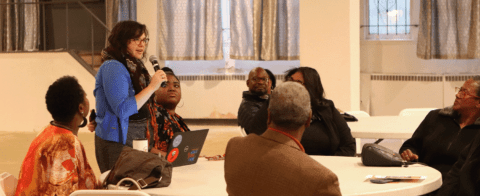NeighborHUB FAQ
Have a question about the NeighborHUB grant? Review the list of frequently asked questions below to learn more about the program.
- Who can apply?
-
- Non-Profits: Any registered 501c(3) non-profit organization working in Detroit, Hamtramck, or Highland Park can apply for this grant. Grants can only be awarded to registered nonprofits. Unincorporated community groups may seek a fiduciary that is a registered 501(c)(3) and is identified as a core partner on the project.
- Small Businesses:
- Valid business with EIN number
- At least 1 year in operation
- Less than 25 employees
- Less than $500,000 gross revenue in last year
- Located in Detroit, Highland Park, or Hamtramck
- How can funds from the NeighborHUB grant be used?
-
Grantees can request up to $25,000 (non-profit) or $15,000 (small business) to implement their project or improve their business.
Nonprofit grant funds should primarily be used toward the development/improvement of the neighborhood “hub” and costs associated with activating and programming the space. Ideal projects will focus on one specific element or program as opposed to partial funding for a larger proposal.
Small business grants should be used to improve the business, such as: building improvements, new or additional signage, new equipment, interior updates, additional delivery/mobile vehicles, enhancing online operations, etc.
- What documents do I need?
-
- Nonprofits:
- Documentation of 501c3 status,
- Names of organization and project leaders
- Property ownership documentation of the neighborhood “hub.” If the property is owned by the grantee, attach proof of ownership documentation (copy of a deed or title). If the property is owned by a partner, submit a letter from the property owner stating that the space can be used for purposes outlined in the grant and any associated costs with utilizing the space.
- Photos/renderings and letters of support from other organizations are encouraged
- Small businesses:
- EIN number
- Name of the primary business owner and building owner (if not the same)
- Most recent tax information, and recent profit and loss statement
- Photos/renderings and letters of support from other organizations are encouraged
- Nonprofits:
- How and where can I tell my organization or businesses story in the application?
-
The best place to share your story is in the “Project Description” section of the NeighborHUB application. A compelling story is essential to making your application stand out from other submissions that could overlap in mission and location. For example, sharing the history of why the organization or business was created and how it has evolved into where it is today.
For application writing assistance, please contact Michigan Community Resources.
- When do applications open?
-
Applications open in October 2024.
- How will my application be evaluated?
-
Following the grant deadline, an advisory group made up of representatives from various non-profit and business organizations will evaluate each proposal. Criteria that will be evaluated includes:
- Does the project address a community-identified need? (nonprofits)
- How would these improvements help the business grow or survive? (small businesses)
- What are the goals and outcomes?
- How will these goals and outcomes be measured and assessed?
- For nonprofits: how many individuals served, number of classes held, items distributed, etc.
- For small businesses: number of new customers, increased revenue, more products created, etc.
- How well does the applicant tell their story?
- Can the project be completed within the 12-month timeline? If not, is there identified funding to continue the project after the grant period ends?
- Does the applicant plan to collaborate with other organizations or businesses in the neighborhood?
- What will the grant money be used for?
- What are the risks of the project?
- Is there a leader being held accountable for project implementation?
- What is the grant timeline and reporting process?
-
Funds will be distributed to grantees in January and available through December. Grantees are expected to participate in at least three meetings with other grantees to discuss challenges, successes, and capacity building throughout the year.
Additionally, grantees will write at least two blogs about their projects through the grant term and submit a short grant report at the end of the year with final outcomes, lessons, and best practices.

Join the Chamber to expand your customer base while cutting costs.
Plug into best-in-class research, news, and events. Be heard in government. Become a member of the Detroit Regional Chamber.
Learn How



